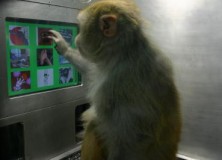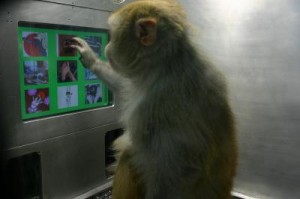As I wrote in my last post, three kinds of behaviours are most often discussed in debates about animal consciousness and cognition:
“1. Mirror self-recognition
2. Tests of metacognition;
3. Metacognition of others’ mental states” (Gómez 2009: 45)
After having discussed the first capacitiy in my previous post, I will discuss the latter two in this post, starting with metacognition, that is being aware of one’s own knowledge states, and then turn to being aware of other’s mental states.
Metacognition.
Being aware of one’s own mental states, i.e., reflective consciousness, surely seems to be one of the most crucial components of self-awareness. In one paradigm used to test for metacognitive awareness, monkeys were trained to select, out of a number of two or more images, the one that is identical to an image they have been shown earlier. As is to expected, the monkeys’ performance progressively deteriorated the longer the delay was between the sample image and the selection task.
Continue reading “Animal Cognition & Consciousness (II): Metacognition & Mentalizing”


